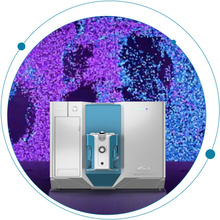Depending on the samples you are running on the system, it is possible for the Open Port Interface (OPI) electrode to become dirty or occluded over time. Below are two different cleaning strategies that can help you maintain your Echo® MS system and keep your OPI...
Tags
Methods for OPI electrode cleaning for Echo® MS system electrodes
Depending on the samples you are running on the system, it is possible for the Open Port Interface (OPI) electrode to become dirty or occluded over time. Below are two different cleaning strategies that can help you maintain your Echo® MS system and keep your OPI...
Using Scheduled Ionization to reduce system ion load for proteomics data acquisition
When analyzing highly complex samples from biological matrices, there can be significant amounts of material that elute in the wash cycle of the LC run, depending on the up-front sample preparation used. The Scheduled Ionization mode, available in both SCIEX OS...
Assess the performance of the Echo® MS system
To obtain the best, most reproducible results using the Echo MS system, it is important to select the best solvent for your analyte and matrix and to ensure the flow rate is optimized for your solvent. Please review this flow rate optimization community post to...
How to optimize sample plating to run Echo MS system in ‘Fast acquisition mode’
The Echo MS system can acquire data extremely rapidly, at 1 second per sample. To achieve this speed, it should be ensured that there is adequate time between ejections for the analyte signal to return to baseline between ejections. Plating your samples such that you...
How to download and use SVG files from OneOmics suite
Results workspaces in the OneOmics suite contain a variety of figures, all available for download as SVG (scalable vector graphic) files. To download your figures, select the orange arrow icon located in the upper right-hand corner of each plot. Download will...
How do I define the experimental design (the metadata) for my SWATH acquisition study within the OneOmics suite? What are the requirement for replicates?
In quantitative Omics research, the goal is to understand which analytes (protein or metabolite) are perturbed between experimental conditions; therefore we carefully design our studies to explore these questions. The algorithms used within the Assembler application...

Breaking down the SCIEX Triple Quad™ 7500 LC-MS/MS System – QTRAP® Ready
Sensitivity and robustness carry different meanings in the world of mass spectrometry. Generally, sensitivity refers to an instrument’s ability to achieve lower limits of detection (LOD). Robustness, on the other hand, refers to an instrument’s ability to consistently...

A rising star in food allergen research: proteomics of shellfish allergen
It’s important to know what you’re eating, especially if you suffer from a food allergy.
About 220 million people worldwide live with a food allergy.1 These numbers, along with the complexity and severity of conditions, continue to rise. In America, there are about 32 million food allergy sufferers—5.6 million of those are children under the age of 18.2.2 That’s 1 out of every 13 children, or about 2 in every classroom. From a financial perspective, the cost of food allergy childcare for US families is up to $25 billion
No Results Found
The page you requested could not be found. Try refining your search, or use the navigation above to locate the post.
No Results Found
The page you requested could not be found. Try refining your search, or use the navigation above to locate the post.



 Contact Support
Contact Support